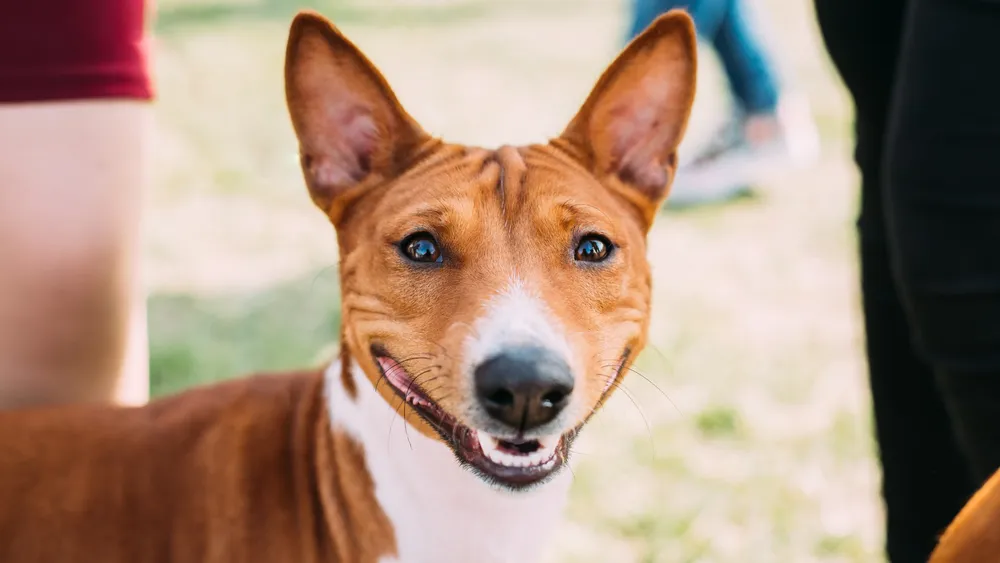Basenji dogs are a unique breed that has origins in Africa. Many people wonder if these dogs are rare, and the answer is yes and no. While they are not as common as some other breeds, they are not considered to be extremely rare either.

The Basenji is a hunting dog that was originally bred in Central Africa. They are known for their distinctive yodel-like bark, which is unlike any other dog breed. Basenjis are also unique in that they do not bark like most dogs, but instead make a variety of other vocalizations such as growls, whines, and yodels.
While Basenjis are not as common as some other breeds, they are not considered to be extremely rare either. According to the American Kennel Club, the Basenji ranks 90th in popularity out of 197 breeds. However, they are still a relatively uncommon breed and may be harder to find than more popular breeds such as Labrador Retrievers or German Shepherds.
Basenji Origins and History
The Basenji dog breed has a rich history that dates back thousands of years. This section will explore the origins of the Basenji breed and its journey to the Western world.

Ancient Roots in Africa
The Basenji breed is believed to have originated in Central Africa, specifically in the Congo region. Evidence of dogs resembling the Basenji can be found in ancient Egyptian tombs and wall art, dating back to 3600 BC. These dogs were highly valued for their hunting skills, which included tracking and catching small game.
The Basenji's unique characteristics, such as their tightly curled tails and yodel-like vocalizations, set them apart from other dog breeds. Their ability to hunt silently also made them highly prized by African hunters.
Introduction to the Western World
The Basenji was first introduced to the Western world in the late 19th century when British explorers brought them back from their African expeditions. The breed quickly gained popularity among dog enthusiasts in Europe and North America.
In 1943, the American Kennel Club recognized the Basenji as a distinct breed. Despite their popularity, the Basenji remains a relatively rare breed, with only a few thousand registered each year.
The Basenjis are known for their intelligence, independence, and affectionate nature. They are also highly energetic and require regular exercise to stay healthy and happy.
The Basenji breed has a fascinating history that is deeply rooted in ancient African culture. Their unique traits and abilities have made them a beloved breed among dog enthusiasts worldwide.

Physical Characteristics
Distinctive Features
Basenjis are a unique breed of dog that is known for their distinctive features. One of the most notable features of the Basenji is their barkless nature. Instead of barking, they make a yodeling sound that is quite distinct and can be heard from a distance. They are also known for their cat-like grooming habits, which include licking themselves clean and being relatively odorless.
Coat and Colors
Basenjis have a short, smooth coat that comes in a variety of colors, including black, brindle, red, and tricolor. Their coat is relatively easy to care for and requires minimal grooming. They shed very little, making them a good choice for people with allergies.
Size and Weight
Basenjis are a small to medium-sized breed, typically weighing between 22 and 24 pounds and standing 16 to 17 inches tall at the shoulder. They have a lean, muscular build and are known for their agility and speed.
Overall, the Basenji is a rare and unique breed of dog with many distinctive features. Their barkless nature, cat-like grooming habits, and short, smooth coat make them an interesting and low-maintenance pet for those looking for something a little different.
Behavior and Temperament
Personality Traits
Basenji dogs are known for their independent and alert personalities. They are curious and energetic and tend to be reserved around strangers. Basenjis are also known for their unique vocalization, which is often described as a yodel or a bark-like sound.
Intelligence and Training
Basenjis are intelligent dogs, but they can be stubborn and difficult to train. They require a patient and consistent approach to training and respond best to positive reinforcement methods. Basenjis are also known for their strong prey drive, which can make training challenging.
Social Behavior with Humans and Pets
Basenjis are generally good with children and make loyal and affectionate companions. However, they can be reserved around strangers and may not be the best choice for households with frequent visitors. Basenjis can also be territorial and may not get along well with other dogs or pets. Early socialization and training can help to mitigate these tendencies.
In summary, Basenji dogs have unique personalities and require a patient and consistent approach to training. They can make loyal and affectionate companions, but may not be the best choice for households with frequent visitors or other pets.
Health and Lifespan

Common Health Issues
Basenjis are generally healthy dogs, but like all breeds, they can be prone to certain health issues. One of the most common health issues in Basenjis is Fanconi syndrome, a kidney disorder that affects the dog's ability to absorb nutrients. Symptoms of Fanconi syndrome include excessive thirst, frequent urination, and weight loss. Basenjis can also be prone to hip dysplasia, a condition where the hip joint doesn't develop properly, which can lead to arthritis and lameness.
Another health issue that Basenjis can develop is Progressive Retinal Atrophy (PRA), a degenerative eye disease that can lead to blindness. Basenji Enteropathy is another condition that can affect the breed, causing chronic diarrhea and weight loss. Early diagnosis and treatment are important for managing these conditions.
Diet and Nutrition
A healthy diet is important for all dogs, and Basenjis are no exception. They require a balanced diet that is high in protein and low in fat. It's important to choose a high-quality dog food that meets their nutritional needs. Basenjis can also benefit from fresh fruits and vegetables as a source of vitamins and minerals. Owners should avoid feeding their Basenjis table scraps or human food, as this can lead to obesity and other health issues.
Expected Lifespan
On average, Basenjis have a lifespan of 12-14 years. However, with proper care and attention to their health, some Basenjis have been known to live into their late teens. Regular veterinary checkups, a healthy diet, and plenty of exercise can help ensure a long and happy life for your Basenji. It's important to be aware of the common health issues that can affect the breed and to seek prompt veterinary care if your dog shows any signs of illness.
Care and Grooming
Basenji dogs are low-maintenance when it comes to grooming, but they still require regular exercise and mental stimulation to stay healthy and happy. In this section, we'll cover the exercise, grooming, and mental stimulation needs of these unique dogs.
Exercise Needs
Basenjis are known for their high energy level and playful nature. They require daily exercise to keep them physically fit and mentally stimulated. A brisk walk or jog around the block is a good way to get started, but they also enjoy playing in a fenced-in yard or going on hikes. It's important to note that Basenjis are escape artists and should always be kept on a leash or in a secure area.
Grooming Requirements
Basenjis have a short, fine coat that requires minimal grooming. They shed seasonally, but regular brushing can help minimize shedding. Basenjis are also known for their cleanliness and will groom themselves like cats. Bathing should only be done as needed, as frequent bathing can strip their coat of natural oils.
Mental Stimulation
Basenjis are intelligent dogs that require mental stimulation to prevent destructive behavior. Puzzle toys, obedience training, and agility courses are great ways to keep them mentally stimulated. They also enjoy playing with their owners and other dogs, so socialization is important.
Overall, Basenjis are a low-maintenance breed when it comes to grooming, but they do require regular exercise and mental stimulation to stay healthy and happy. With proper care, they can make great companions for active families.
Basenji as a Hunting Dog
The Basenji is a breed of hunting dog that originated in Central Africa. They were primarily used by hunters to track and hunt small game animals like rabbits, squirrels, and birds.
Hunting Abilities
The Basenji is an excellent hunting dog due to its keen sense of smell, sharp eyesight, and agility. They are also known for their speed and can easily outrun most small game animals. The breed is also known for its alertness and can easily detect any movement or sound in its surroundings.
Vocalizations and Communication
The Basenji is a unique breed of dog as it is known for its yodel-like vocalizations instead of the typical barking. This is due to the structure of their larynx, which is different from other dog breeds. They also communicate with their owners through a variety of sounds, including growls, whines, and grunts.
In terms of communication with other dogs, the Basenji is known to be independent and can sometimes be aloof. However, they are also known to be friendly and playful with other dogs if they are socialized properly from a young age.
Overall, the Basenji is a rare breed of dog that is highly skilled in hunting small game animals. Their unique vocalizations and communication style make them a fascinating breed to own and train.
Breed Specifics
Basenji dogs are a unique and interesting breed that has gained attention in recent years due to their distinctive characteristics. In this section, we will explore some of the key aspects of the breed, including recognition by kennel clubs and breeding practices.

Recognition by Kennel Clubs
The Basenji breed has been recognized by various kennel clubs around the world, including the American Kennel Club (AKC). The AKC first recognized the breed in 1943, and it is currently classified under the Hound group. The Basenji Club of America is the official AKC parent club for the breed, and they provide information and resources for breeders and owners.
Breeders and Breeding Practices
When it comes to breeding Basenji dogs, it is important to work with reputable breeders who follow responsible breeding practices. This includes health testing and screening for genetic conditions that are common in the breed. Additionally, responsible breeders prioritize the well-being of their dogs over profit and ensure that their puppies are placed in loving and suitable homes.
As a rare breed, there are fewer Basenji breeders compared to other popular dog breeds. However, this does not mean that the breed is necessarily difficult to find. Prospective owners can start by contacting the Basenji Club of America for a list of reputable breeders in their area.
Overall, Basenji dogs are a unique and fascinating breed with a rich history and distinct characteristics. With careful research and consideration, they can make wonderful companions for the right owner.
Ownership Considerations
Pros and Cons of Basenji Ownership
Basenjis are affectionate, intelligent, and playful dogs. They are also known for being independent and stubborn, which can make them difficult to train. They are low-shedding dogs, which can be a plus for people with allergies or who don't like cleaning up dog hair. Basenjis are also protective and make good watchdogs, but they are not aggressive.
One of the downsides of owning a Basenji is that they can be a rare breed, which can make them difficult to find. They are also known for being escape artists, so owners need to make sure their yards are secure. Basenjis are also not recommended for families with small children, as they can be too rough during playtime.
Cost and Availability
Basenjis can be expensive, with prices ranging from $1,000 to $2,500. They are also a rare breed, which means they may not be readily available in all areas. Prospective owners should research breeders carefully and be prepared to travel to find a reputable breeder.
It's important to note that adopting a Basenji from a shelter or rescue organization can be a more affordable option. However, it may be more difficult to find a Basenji in a shelter or rescue organization due to their rarity.
Overall, owning a Basenji can be a rewarding experience for the right person or family. Prospective owners should carefully consider the pros and cons of Basenji ownership, as well as the cost and availability of the breed.
Additional Information
Fun Facts
- Basenjis are known for their unique yodel-like bark instead of traditional bark.
- They are one of the oldest dog breeds in the world, dating back to ancient Egypt.
- Basenjis are excellent climbers and have been known to climb trees to escape danger or to chase prey.
- They have a strong prey drive and are skilled hunters, which can make them a challenge to train off-leash.
- Basenjis have a strong sense of smell and are often used in hunting and tracking competitions.
Conclusion

In conclusion, Basenji dogs, with their unique history, distinctive features, and independent nature, make for fascinating companions. Understanding their temperament and addressing their specific needs is essential for a fulfilling relationship between Basenji and the owner.
Frequently Asked Questions (FAQs)
- Are Basenjis rare?
- While Basenjis are not as common as some other dog breeds, they are not considered rare. According to the American Kennel Club, Basenjis rank 84th out of 196 breeds in popularity.
- Are Basenjis good pets?
- Basenjis can make great pets for the right owner. They are intelligent, energetic, and affectionate with their families. However, they can be mischievous and require a lot of exercise and mental stimulation to stay happy and healthy.
- Do Basenjis like to cuddle?
- Basenjis are not known for being particularly cuddly dogs. They are independent and confident and may prefer to be near their owners rather than on their laps. However, they do enjoy affection and attention from their families.
- Are Basenjis good for outdoor activities?
- Basenjis are active dogs that enjoy outdoor activities such as hiking and running. However, they should always be kept on a leash or in a secure area, as their strong prey drive can lead them to chase after small animals.
- Do Basenjis get along with other dogs?
- Basenjis can be selective about their doggy companions and may not get along with all dogs. Early socialization and training can help prevent aggression towards other dogs, but it is important to supervise Basenjis when they are around other animals.
- When do Basenjis go into estrus?
- Basenjis typically go into estrus, or heat, twice a year. This can vary depending on the individual dog, but it usually occurs in the spring and fall. It is important to spay or neuter Basenjis if they are not being used for breeding purposes.
- Are Basenjis related to wolves?
- Basenjis are not directly related to wolves, but they do share some genetic similarities. They are part of the sighthound group, which also includes breeds such as Greyhounds and Whippets.